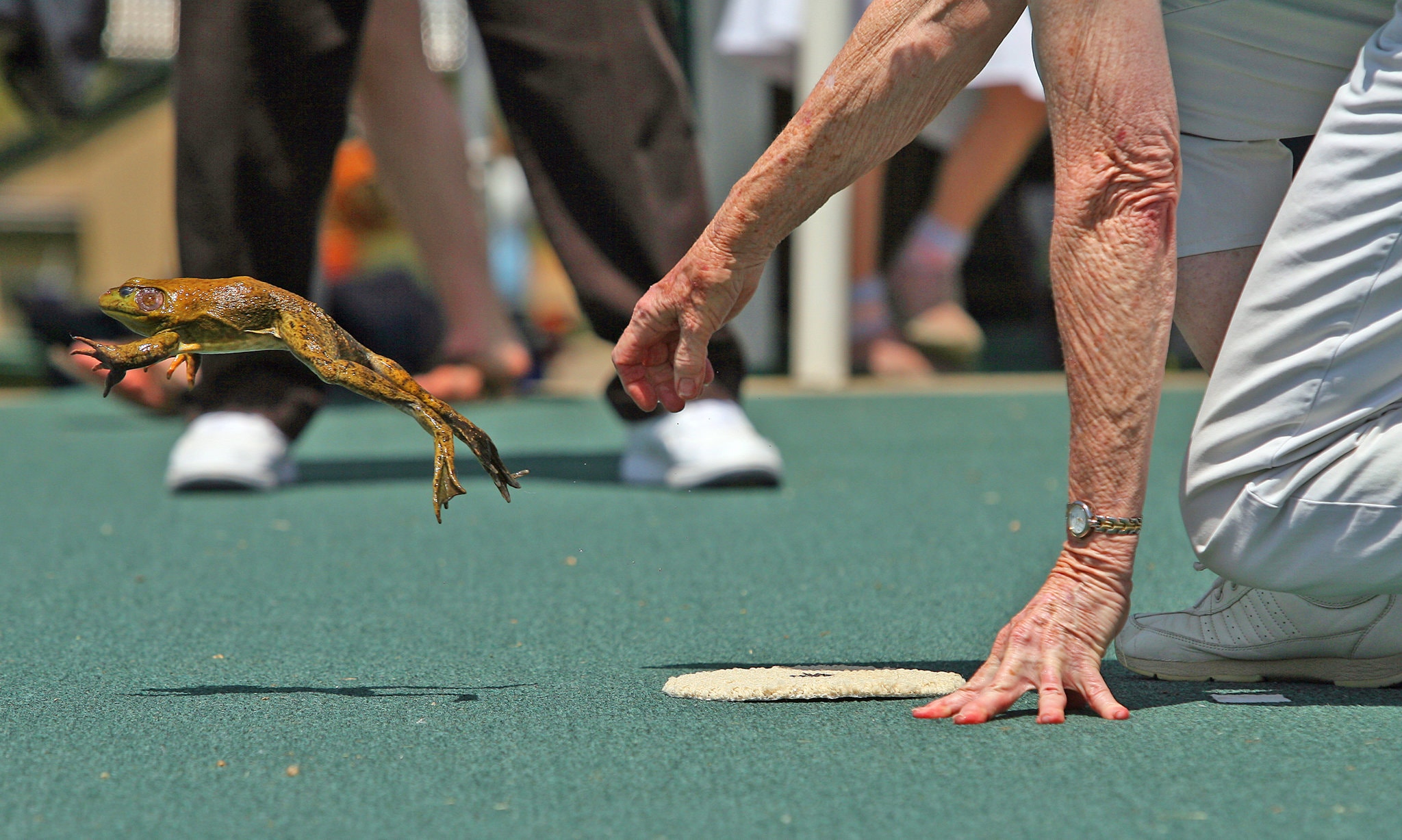Another Covid-19 Loss? The Jumping Frog Jubilee

The annual Calaveras Jumping Frog Jubilee in Angels Camp, Calif., has been held since 1928. Jim Wilson/The New York Times
May 11, 2020
Since Jon Kitchell began competing in the annual Calaveras Jumping Frog Jubilee, his brother has won, his wife has won, and his son has won. Even his daughter-in-law has won. As for Mr. Kitchell, 58, he’s still working on it. “I think every year is the year,” he said.
Except this year. For the first time in four decades, Mr. Kitchell won’t spend the third weekend in May trying to get his bullfrogs to jump across a stage in Angels Camp. “Covid-19 won this year,” he said. “The world champion.”
Whether it’s Easter Sunday or the N.B.A. season, group gatherings of any kind have bowed to the coronavirus pandemic. And there is no exception for a frog-jumping competition that started 92 years ago to honor a Mark Twain story and this town’s gold-rush legacy.
For Mr. Kitchell’s family, the frog jump is almost a way of telling time. Each year is marked by the nights deep in the woods, eyes peeled not just for any frog but for the right frog. Then the days spent feeding and naming, every frog a potential winner, until the finals begin on the last afternoon of the four-day county fair.
The fair draws 45,000 people to Angels Camp, a town of about 4,000 in the Sierra Nevada foothills, and adds an estimated $5 million to the community. For many locals working on ranches, in restaurants and tire shops, it’s the one vacation they take all year.
“How could you live here and not jump a frog?” said Merita Callaway, a Calaveras County supervisor.
Like many great traditions, the event began with a legend. The first frog-jumping contest was held here in 1928, many decades after Twain wrote “The Celebrated Jumping Frog of Calaveras County.” The event has been canceled only once before — in 1933, during the Great Depression.
The rules are simple. Competitors place a frog on an eight-inch lily pad and try to make it jump as far as possible. A referee marks the landing spot of the third jump with a long wooden stick while two volunteers measure the distance and a third chases down the startled frog with a fishing net. Of the roughly 2,000 frogs that compete over the first three days, the top 50 qualify for the finals. The world record leap: 21 feet 5 ¾ inches, in 1986 by Lee Giudici’s frog, Rosie the Ribiter. Best it and you take home $5,000.
Strategy is paramount, according to competitors. Choose too large a frog and it risks being too heavy; too small and it lacks power. Each frog jockey has their own strategy for prompting the jumps. Some stamp and shout, while others simply blow on their frogs.
Preparations are often shrouded in secrecy. In the week leading up to the festival, the Kitchells catch dozens of frogs, keeping them in tanks at a special temperature (Mr. Kitchell won’t divulge it; retired jockeys suggest 83 degrees is optimal).
One successful team keeps its frogs in gunny sacks in a wine cellar. Others bathe their competitors in hot and cold water just before the jump. The Kitchells even held a vote before agreeing to share family secrets with Mr. Kitchell’s daughter-in-law, Morgan.
“If a frog jockey is telling you something, you should be very skeptical,” Mr. Kitchell said.
Once, Mr. Kitchell nearly tasted victory himself. On a cold, drizzly day in 2006, he entered the finals as the favorite. In qualifying rounds, his frog, Whipper, had jumped 21 feet 9 ¼ inches — far enough to set a world record, had it been the finals.
When his turn came, Mr. Kitchell carried Whipper from his wooden “frog hotel” to the lily pad on the stage, lightly pinching the frog’s sides between two fingers. For a moment, Whipper’s legs dangled just off the pad. Then Mr. Kitchell let go.
One jump. Reasonably far. Second jump. Straight like an arrow. Third jump. Whipper hooked left.
The judge announced the distance: 18 feet, 6 and ¾ inches, a foot less than the frog belonging to Mike Nash, Mr. Kitchell’s good friend since elementary school. Second place.
There’s a theory that Mr. Nash and Mr. Kitchell switched frogs that day. If so, Mr. Nash offered few clues. “Tell you the truth, I tilt a few beers and have a good time,” he said. “I’ll leave it at that.”
Every year after the jump, entrants return their frogs to the ponds, lakes and streams where they were caught. The champion’s name is engraved in brass on the sidewalk of downtown Angels Camp, a “Frog Hop of Fame” extending back to 1928.
To Calaveras residents, losing the Jubilee this year feels like more than just another cancellation. In a county of 45,000 spread over a thousand square miles, the festival serves as an extended family reunion. It’s a chance to rekindle old friendships and older rivalries. Even if you don’t see someone all year, you know you’ll see them at the frog jump. You’ll talk about the memories, and those who have passed on.
This year, that connection is lost. For a community that relies on tourism, the economic impact is equally severe. Every dollar the frog jump brings to town counts.
“It’s not just a little festival we have every year,” said Laurie Giannini, the fair manager. “It’s a lifeline.”
But now it will be another long year, until the snow falls and melts in the mountains, until it’s the third weekend in May, and Mr. Kitchell gets another crack at Calaveras immortality. “All it takes is one jump,” he said.


